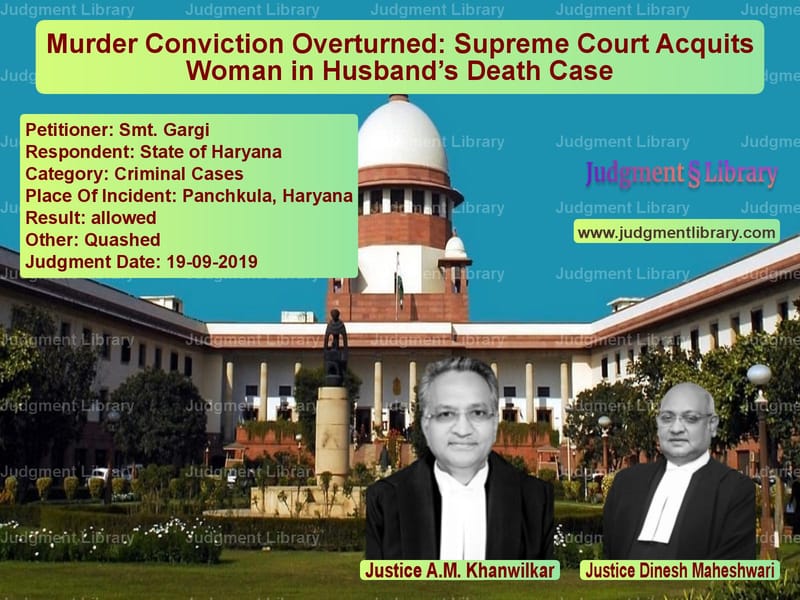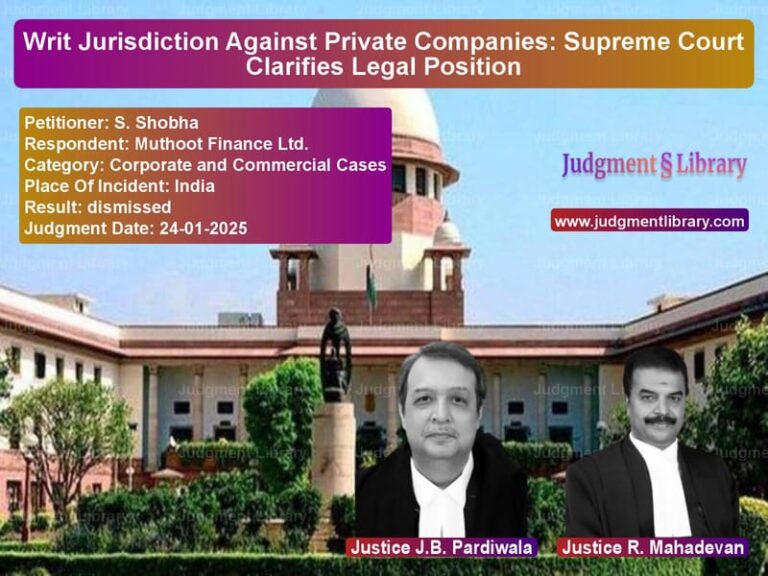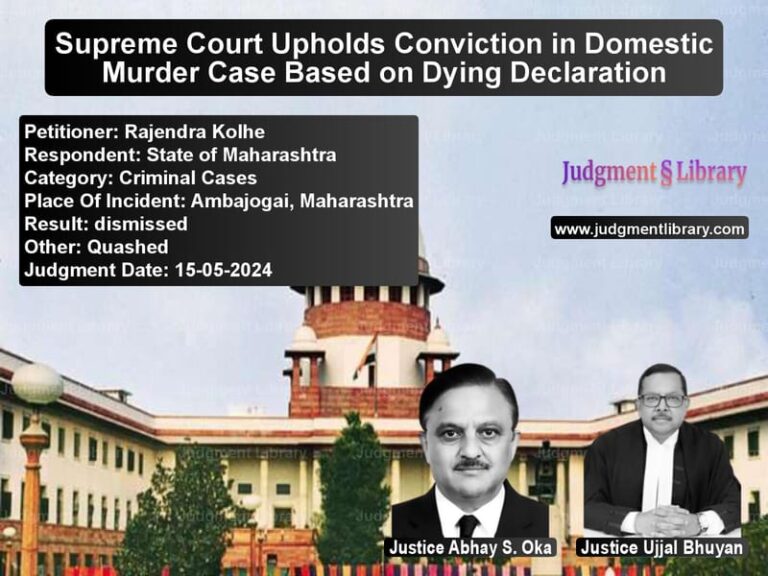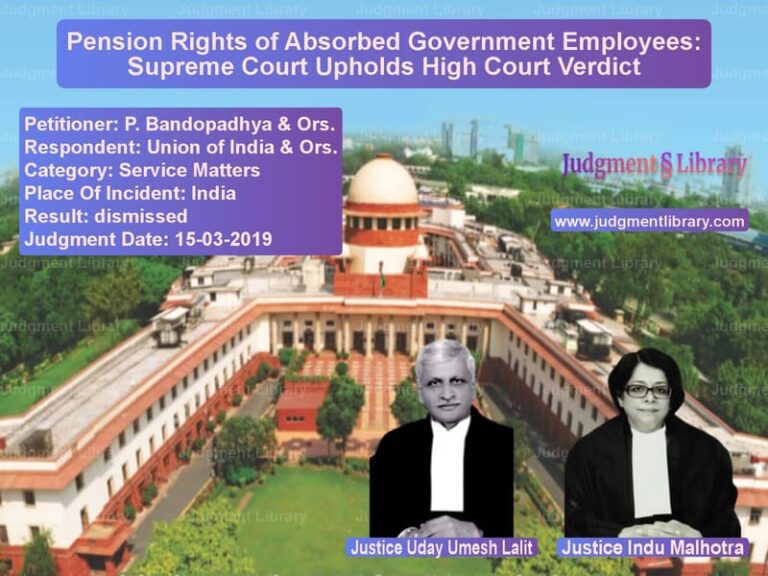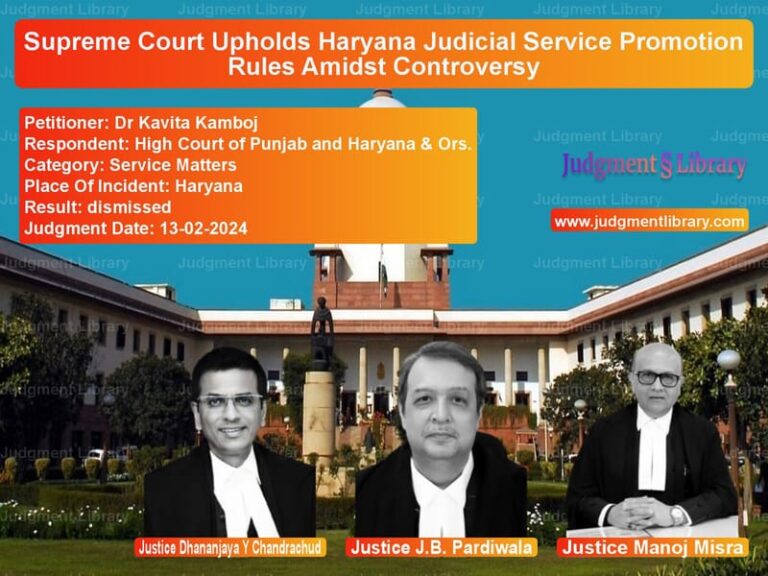Murder Conviction Overturned: Supreme Court Acquits Woman in Husband’s Death Case
The Supreme Court of India recently ruled on a crucial case involving the murder conviction of Smt. Gargi, who was accused of killing her husband and staging the crime as a suicide. The case, which was based entirely on circumstantial evidence, was overturned due to major shortcomings in the investigation, inconsistencies in witness statements, and the lack of a direct link proving the appellant’s guilt beyond reasonable doubt. The Supreme Court’s ruling provides key insights into the evaluation of circumstantial evidence in criminal cases.
Background of the Case
The case revolved around the death of Tirloki Nath, whose body was found hanging from a ceiling fan in his residence in Panchkula, Haryana, on May 1, 1997. His wife, Smt. Gargi, was accused of strangling him with the help of her brothers and then hanging the body to make it appear as a suicide. The prosecution’s case was primarily based on circumstantial evidence, including the alleged strained relationship between the deceased and his wife.
Following an investigation, the trial court convicted Smt. Gargi and her brothers under Section 302 of the Indian Penal Code (IPC) for murder. However, the Punjab and Haryana High Court later acquitted her brothers while upholding her conviction, concluding that she was the principal offender.
Arguments of the Appellant (Smt. Gargi)
The appellant’s counsel raised the following key arguments:
- The case was based purely on circumstantial evidence, with no direct proof linking her to the crime.
- The prosecution’s claim that the appellant had a strained relationship with her husband and was involved in illicit affairs was unsubstantiated and lacked independent corroboration.
- The investigation was biased and failed to consider other possibilities, including the involvement of other parties.
- The deceased’s brother (PW-7) had a vested interest in implicating the appellant due to property disputes.
- The High Court acquitted the appellant’s brothers, yet concluded that she committed the crime alone, which was inconsistent given the nature of the alleged offense.
Arguments of the Respondents (State of Haryana)
The prosecution and the State of Haryana presented the following counterarguments:
- The medical evidence confirmed that the deceased was strangled before being hanged, indicating a staged suicide.
- The deceased had expressed fear that the appellant might kill him, which was corroborated by family members.
- The appellant failed to explain her husband’s death despite being the last person seen with him.
- Her conduct after the incident, including allegedly serving tea to relatives while the body was still hanging, was suspicious.
Supreme Court’s Analysis
The Supreme Court meticulously examined the evidence and found several fundamental shortcomings in the prosecution’s case:
1. Lack of Direct Evidence
The Court observed that the case was entirely based on circumstantial evidence, requiring a complete and unbroken chain of events pointing to the appellant’s guilt. However, the prosecution failed to establish such a link beyond a reasonable doubt.
2. Inconsistencies in Witness Testimonies
The key prosecution witnesses, PW-7 (brother of the deceased) and PW-8 (sister of the deceased), provided contradictory statements regarding the deceased’s alleged fear of the appellant. Additionally, their statements showed signs of exaggeration and personal bias due to property disputes.
3. Investigation Shortcomings
The Supreme Court noted several lapses in the police investigation:
- The initial information about the death was received from a third party, but no record was made of who provided the information or how it was conveyed.
- The police failed to collect fingerprint evidence from the crime scene.
- The statements of the deceased’s children and other crucial witnesses, including neighbors and tenants, were not recorded.
- The investigator did not properly examine alternate possibilities regarding the crime.
4. No Clear Motive
The prosecution’s claim that the appellant had an illicit relationship and wanted the property transferred in her name was not supported by concrete evidence. The Court found that mere allegations without proof could not establish motive.
5. Effect of Acquittal of Co-Accused
The High Court had acquitted the appellant’s brothers, yet it held that she committed the crime alone. The Supreme Court found this conclusion to be flawed, as the nature of the crime (strangulation followed by staging a suicide) required more than one person.
Final Judgment
The Supreme Court ruled in favor of the appellant, overturning her conviction. The Court held:
“It would be unsafe to accept that the implicating circumstances have been established by cogent evidence and such circumstances form a complete chain that rules out any other hypothesis except guilt of the appellant. Hence, the conviction of the appellant cannot be sustained; she is entitled to the benefit of doubt.”
The Court set aside the trial court and High Court’s judgments, acquitting Smt. Gargi and canceling her bail bonds.
Implications of the Judgment
This ruling highlights the importance of ensuring that circumstantial evidence is thoroughly scrutinized in criminal cases. Key takeaways from the judgment include:
- Convictions based solely on circumstantial evidence must meet a high standard of proof.
- Investigations must be conducted impartially, without overlooking crucial evidence or witnesses.
- Statements from interested parties (such as family members with property disputes) must be corroborated by independent evidence.
- When co-accused are acquitted, courts must carefully examine whether the remaining accused could have committed the crime alone.
The Supreme Court’s decision in this case reinforces the fundamental principle that the burden of proof lies with the prosecution, and an accused cannot be convicted on suspicion or incomplete evidence.
Petitioner Name: Smt. Gargi.Respondent Name: State of Haryana.Judgment By: Justice A.M. Khanwilkar, Justice Dinesh Maheshwari.Place Of Incident: Panchkula, Haryana.Judgment Date: 19-09-2019.
Don’t miss out on the full details! Download the complete judgment in PDF format below and gain valuable insights instantly!
Download Judgment: Smt. Gargi vs State of Haryana Supreme Court of India Judgment Dated 19-09-2019.pdf
Direct Downlaod Judgment: Direct downlaod this Judgment
See all petitions in Murder Cases
See all petitions in Bail and Anticipatory Bail
See all petitions in Judgment by A M Khanwilkar
See all petitions in Judgment by Dinesh Maheshwari
See all petitions in allowed
See all petitions in Quashed
See all petitions in supreme court of India judgments September 2019
See all petitions in 2019 judgments
See all posts in Criminal Cases Category
See all allowed petitions in Criminal Cases Category
See all Dismissed petitions in Criminal Cases Category
See all partially allowed petitions in Criminal Cases Category

